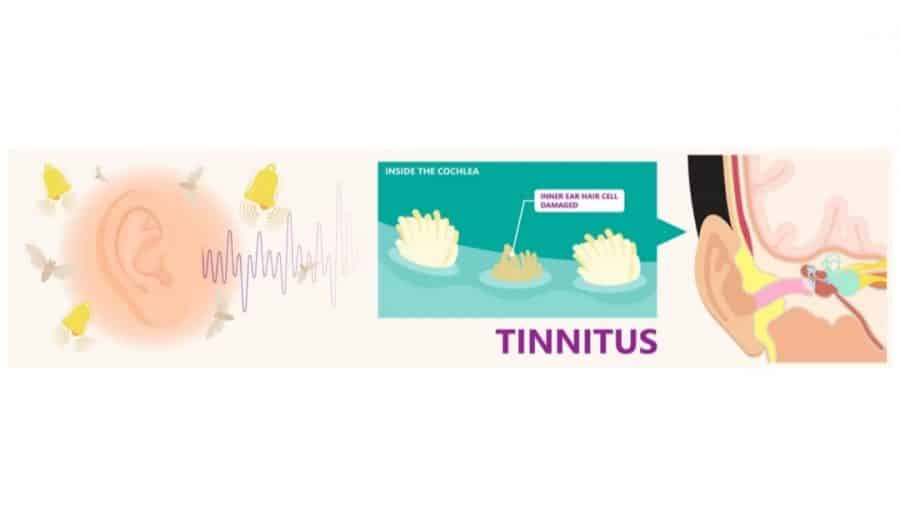Do you experience an incessant ringing in your ears that simply won’t go away? If so, you may be one of the millions of individuals living with tinnitus. This common hearing problem, which affects over 50 million Americans 1https://www.ata.org/understanding-facts, is the perception of noise when there are no external stimuli. Essentially, the individual is “hearing” noises that no one else can. Depending on the severity, tinnitus can be simply a minor annoyance or make a major impact on your daily life.
While there is no cure, there are several treatment options that have proved effective for countless tinnitus patients. But do you necessarily need to see an audiologist to treat your tinnitus symptoms? Or are there ways that you can lower your stress, reduce your anxiety, and hardly even notice that ringing noise? Here, we’re taking a closer look at tinnitus, its causes, and the different treatment options—some that don’t even require you to make that trip to your doctor’s or audiologist’s office.
WHAT ARE THE SYMPTOMS AND COMPLICATIONS OF TINNITUS?
No two cases of tinnitus are the exact same, which can make it a challenging hearing problem to identify. How do you explain that constant ringing sound in your ears if no one else can hear it? By understanding the common symptoms of tinnitus, you can better assess whether or not you may be experiencing this hearing problem.
The primary symptom of tinnitus is the “phantom noise” that only you can hear. While often sounding like a slight buzzing or humming, tinnitus can also manifest as one of these other types of sounds:
- · Clicking.
- · Roaring.
- · Hissing.
- · Pulsing (like a heavy heartbeat).
Depending on the severity of your tinnitus symptoms, that ringing in the ears could be just a minor annoyance or severely impact your daily life. Since tinnitus makes it more difficult to communicate, this can often lead to anxiety, stress, and difficulty at work or just maintaining your personal relationships.
Over time, severe cases of tinnitus can lead to additional health problems, including depression, anxiety, or sleep problems like insomnia. In extreme cases, tinnitus can even lead to suicide when the individual simply can’t cope with the complications of this hearing problem. These cases further highlight the importance of reaching out (whether to an audiologist or just a good friend or family member) if you’re suffering from tinnitus. No matter your case, there is some form of help available.
WHAT CAUSES TINNITUS?
Similar to how each case of tinnitus is uniquely experienced, there are many different causes of this hearing problem. From certain diseases, types of injuries, or exposure to loud noises, there is a wide range of tinnitus causes.
Here are some of the most common causes of tinnitus:
- · Age-related hearing loss (the most common cause of tinnitus).
- · Repeated exposure to loud noises.
- · Ear wax build up.
- · Head or neck injuries.
- · Ototoxic medications (certain antibiotics, cancer drugs, water pills, or some antidepressants).
- · Ear bone changes.
- · Muscle spasms in the inner ear.
- · Meniere’s disease.
- · Lyme disease.
- · Acoustic neuroma.
- · Blood vessel disorders.
The cause of your tinnitus will impact the severity of your tinnitus symptoms. Perhaps even more importantly, the cause will shape the most effective treatment plan. This is why it’s so important to receive a comprehensive hearing exam and receive a professional diagnosis for the source of your tinnitus. Tinnitus caused by ear wax blockage, for example, requires a very different plan compared to tinnitus caused by medications or disease.
IS THERE A CURE FOR TINNITUS?
Currently, there is no medical cure for tinnitus. However, this doesn’t mean there isn’t hope for the millions of people who live every day with this hearing problem. Even though there is no cure, doctors have developed a variety of treatment options to help people manage and live with their tinnitus symptoms. Over time, many patients may no longer even notice that buzzing sound in their ears.
There are many different approaches to treating tinnitus, including hearing aids, white noise machines, or behavioral therapy. Audiologists have even developed an advanced technique, known as tinnitus retraining therapy (TRT), which combines sound masking and counseling to retrain how your brain responds to the sounds of tinnitus. Over time, many patients feel less distressed by tinnitus and may hardly even notice it.
CAN YOU TREAT TINNITUS WITHOUT AN AUDIOLOGIST?
This question isn’t as simple as it might first appear. While there are certain things you can do to help relieve your tinnitus symptoms, this doesn’t mean you should disregard communicating with an experienced audiologist or doctor. While they may not be able to “cure” your tinnitus, this doesn’t mean you won’t benefit from their knowledge and expertise. An audiologist can set you on the most effective path toward treating your unique case of tinnitus.
Additionally, it’s recommended to receive a comprehensive hearing exam from an audiologist. This important step can help identify the specific cause of your tinnitus symptoms, which is critical as the causes vary drastically and will determine which treatment option is the most effective for you.
However, there are certain things you can do on your own to help find relief from your tinnitus symptoms. In addition to working with an audiologist, here are some ways to help you manage your tinnitus:
- · Light to moderate exercise.
- · Maintain a healthy diet (especially avoiding foods that are high in sodium).
- · Quit smoking.
- · Avoid drinking alcohol in excess.
- · Meditation and yoga.
- · Using a white noise machine.
CONCLUSION – CAN YOU TREAT TINNITUS WITHOUT AN AUDIOLOGIST?
Every day, millions of individuals live with the symptoms of tinnitus. For some, this is just a minor irritation, but for more severe cases, tinnitus can disrupt your professional life, make communication a struggle, and even lead to anxiety or depression. But you don’t need to suffer alone. While there is no cure for tinnitus, there are many different treatment options that could help you find relief.
While there are some activities that you can do to reduce your tinnitus symptoms (exercise, meditation, maintaining a healthy diet), it’s still recommended that you visit an audiologist for a hearing exam. An audiologist can help you identify the unique cause of your tinnitus, which will then enable you to begin down the most effective path toward treatment.
Additional resources and citations
- 1https://www.ata.org/understanding-facts



